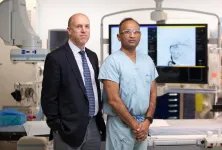(Press-News.org) For many patients, getting ready to have surgery means getting their blood drawn, their heart rhythm checked, or having other tests in the weeks leading up to their operation.
But not all patients need all those tests -- especially if the results won’t change how their surgical team treats them or how well they do afterward.
Now, a new study shows how hospitals can focus the use of such tests on the patients who truly need them, while safely reducing unnecessary testing in others.
The result: less wasted money and resources for each test, and less wasted time for patients and clinical staff.
The study, published in JAMA Surgery by a team from the University of Michigan and Brigham and Women’s Hospital, tested a program designed to reduce unneeded preoperative tests at U-M Health.
It focused on reducing four tests in low-risk patients having breast lumps or diseased gallbladders removed, or hernias fixed, in outpatient operations.
Before the intervention, 37% of such patients had at least one unnecessary test. By the end of the study, that rate dropped to 14%. Overall testing -- the percentage of all patients receiving the four tests before having these operations -- dropped from 51% to 27%.
At the same time, preoperative testing didn’t change for patients who needed it, based on their health status and surgical risk. And rates of emergency department visits and hospitalizations stayed the same in the weeks after patients had their operations, suggesting that reducing unnecessary testing didn’t worsen surgical safety or outcomes.
The new study shows that during the time when U-M Health reduced unnecessary testing and overall testing, the use of the same tests in similar patients stayed the same at dozens of other hospitals in the state.
Making change together, and measuring its effect
The study’s leader says it’s not just the drop in unnecessary testing, but the way the team achieved it and measured it that makes the study different.
The intervention focused on educating clinicians on the evidence that they could safely reduce testing in some patients, and involving them in how they did so, says senior author and U-M Health surgeon Lesly Dossett, M.D., M.P.H.
“If we truly want to reduce wasteful testing, the kind that provides no value and won’t change care, we need to help team members understand the rationale, to base our intervention on what we know about creating lasting positive change, and to provide easy-to-use tools to support clinical decisions,” said Dossett. “We’re excited by what we were able to achieve at our preop clinics, and look forward to testing this in hospitals statewide.”
Dossett co-leads the Michigan Program on Value Enhancement, or MPrOVE, through which the new study was conducted. MPrOVE teams the clinical quality improvement efforts of U-M Health with the rigorous research methods of the U-M Institute for Healthcare Policy and Innovation. It’s funded by Michigan Medicine, U-M’s academic medical center.
More about the study
The study involved 1,143 patients with an average age of 58 seen at U-M Health’s three preop clinics for outpatient surgery sites from June 2022 to the end of August 2023.
U-M Health had high levels of preop testing (both necessary and unnecessary) in a previous study of 63 hospitals across Michigan published in 2021, so it was a key area for improvement.
During the intervention period, the surgeons and physician assistants involved in the preop clinics had multiple sessions with the study team, and worked to build consensus around which patients needed which tests and which did not.
In the end, the clinicians were asked to follow a flow chart and grid – called decision support documents -- to determine which tests a patient should have before surgery, based on their individual characteristics.
The tests in question were selected because years of research and recommendations from national and international health care quality groups have deemed them unnecessary for certain patients. Blood tests called complete blood cell counts (CBCs), basic metabolic panels (BMPs) and comprehensive metabolic panels (CMPs) were targeted, as were electrocardiograms.
Each patient was scored on a standard scale used by anesthesia professionals to rate the risk of a patient suffering a complication during anesthesia. Those on the lowest two rungs were able to forego all four tests unless a specialist had specifically ordered it. But even patients at the higher end of this scale, called the ASA Physical Status, were able to avoid certain tests depending on what other conditions they had.
Alexis Antunez, M.D., M.S., is a U-M Medical School alumna and the study’s first author. She was a visiting surgical research resident at Michigan Medicine at the time of the study and is now at the Brigham and Women’s Department of Surgery.
MPrOVE program manager Tony Cuttitta, M.P.H., notes that several U-M Medical School students worked on the study design and data analysis. He also explains that the U-M team is working to scale up the number of surgical specialties using the approach and evaluate the impacts.
The effort was so successful that the U-M team is partnering with 16 other hospitals across Michigan to repeat the same intervention that spurred the change.
The statewide study, which is funded by a grant from the federal Agency for Healthcare Research and Quality, is now under way. It involves hospitals taking part in collaborative quality initiatives funded by Blue Cross Blue Shield of Michigan and will test whether the model that succeeded at U-M Health is generalizable to other care settings. It will also analyze the financial impact of avoiding unnecessary tests.
In addition to Dossett, Antunez and Cuttita, the study's authors are Ruby J. Kazemi, BA; Caroline Richburg, MD; Cecilia Pesavento, MD, MBA; Andrew Vastardis, MS; Erin Kim, BS; Abigail L. Kappelman, MA; Devak Nanua, MS; Hiba Pediyakkal, BA; Faelan Jacobson-Davies, MA; Shawna N. Smith, PhD; James Henderson, PhD,10; Valerie Gavrila, MPH; and Hari Nathan, MD, PhD.
Dossett, Nathan, Smith and Henderson are members of IHPI; several authors are members of the Center for Healthcare Outcomes and Policy, and the Michigan Value Collaborative.
The study was funded by the National Institutes of Health (T32CA009672), the Agency for Healthcare Research and Quality (R01HS029306-01A1) and Blue Cross Blue Shield of Michigan's support for the Michigan Value Collaborative as part of the BCBSM Value Partnerships program.
END
Wasteful tests before surgery: Study shows how to reduce them safely
Unnecessary blood tests and heart rhythm checks for low-risk surgery patients dropped sharply at U-M Health, while other hospitals stayed the same
2025-02-06
ELSE PRESS RELEASES FROM THIS DATE:
UCalgary researchers confirm best approach for stroke in medium-sized blood vessels
2025-02-06
University of Calgary’s Hotchkiss Brain Institute researchers with the Calgary Stroke Program at Foothills Medical Centre revolutionized treatment for stroke with the ESCAPE Trial, proving that a clot retrieval procedure known as endovascular thrombectomy (EVT) can dramatically improve patient outcomes after an acute ischemic stroke caused by a blockage in a large-sized blood vessel.
Building on that knowledge, the team launched the ESCAPE-MeVO clinical trial to assess whether ischemic stroke patients with blockages in smaller medium-sized vessels could also benefit from EVT. Ischemic strokes are the most common form of stroke. The study, published ...
Nationwide, 34 local schools win NFL PLAY 60 grants to help students move more
2025-02-06
DALLAS, Feb. 6, 2025 — Physical activity positively impacts overall mental and physical wellness which is essential to help children reach their full potential[1]. That is why the American Heart Association, committed to changing the future of health, and the National Football League (NFL) are awarding 34 schools, at least one for each of the NFL teams, with $1,000 grants for physical activity equipment. Through support from the NFL, the NFL PLAY 60 grants are distributed by the American Heart Association annually to recognize those classrooms and ...
New software developed at Wayne State University will help study chemical and biological systems
2025-02-06
DETROIT — Physics-based computer simulations are essential tools for understanding the relationship between atomic-level interactions and physically observable properties of materials. It is from knowledge of these structure-property relationships that new materials can be designed with properties specifically tailored to address the problem of interest.
With the help of a new grant from the National Science Foundation (NSF), a team of Wayne State University College of Engineering researchers are developing new software to support computational materials design. Built on a 15-year collaborative effort, Jeffrey Potoff, Ph.D., chair ...
uOttawa study unveils new insights into how neural stem cells are activated in the adult human brain
2025-02-06
A University of Ottawa neuroscientist has led a Canadian research team to reveal important new insights into the activation dynamics of neural stem cells (NSCs). These are the stem cells that build our central nervous systems and the self-renewing.
The collaborative team led by the University of Ottawa’s Dr. Armen Saghatelyan aimed to shed light on how neural stem cells integrate a multitude of signals from different cell types in the brain – and how they decode these signals.
These are big questions because how NSCs react to signals in their cellular environment controls whether they remain in their ...
Cystic fibrosis damages the immune system early on
2025-02-06
Despite new medication, cystic fibrosis often leads to permanent lung damage. Working with an international team, researchers from the Technical University of Munich (TUM) have discovered that the disease causes changes in the immune system early in life, presumably even in newborns. These changes lead to frequent inflammation and are not affected by drugs targeting the altered mucus production.
Cystic fibrosis is caused by hereditary genetic mutations that impair or halt the production of the CFTR protein. The respiratory tract ...
Novel ‘living’ biomaterial aims to advance regenerative medicine
2025-02-06
UNIVERSITY PARK, Pa. — A biomaterial that can mimic certain behaviors within biological tissues could advance regenerative medicine, disease modeling, soft robotics and more, according to researchers at Penn State.
Materials created up to this point to mimic tissues and extracellular matrices (ECMs) — the body’s biological scaffolding of proteins and molecules that surrounds and supports tissues and cells — have all had limitations that hamper their practical applications, according to the team. To overcome some of those limitations, ...
Warding off superbugs with a pinch of turmeric
2025-02-06
In 2017, a tragic incident unfolded in a Nevada hospital. A woman, admitted for pneumonia, tragically succumbed to multiple organ failure and sepsis. The culprit? A strain of bacteria that had developed resistance to a staggering 26 different antibiotics. These superbugs, or antibiotic-resistant bacteria, stand as one of the most pressing public health threats globally.
Joining the effort to fight these deadly pathogens, researchers at Texas A&M have now shown that curcumin, the compound that gives turmeric its characteristic bright yellow color, can potentially be used to reduce antibiotic resistance.
The ...
Ophthalmic complications in patients on antidiabetic GLP-1 medications are concerning neuro-ophthalmologists
2025-02-06
BUFFALO, N.Y. — A small percentage of patients taking the extraordinarily popular GLP-1 medications have experienced vision problems, but a direct causal link with the drugs has not been established. That is the conclusion of a retrospective study published online on Jan. 30 in JAMA Ophthalmology.
The study focused on nine patients who had experienced vision problems while using semaglutide (brand names Wegovy and Ozempic) and tirzepatide (brand names Mounjaro and Zepbound).
The paper is one of several in the past ...
Physicians committee research policy director speaks today at hearing on taxpayer funded animal cruelty
2025-02-06
WASHINGTON, D.C. — Research Policy Director Elizabeth Baker from the Physicians Committee for Responsible Medicine, a national medical ethics and health advocacy group of 17,000 physicians, spoke today, Feb. 6, at a Congressional hearing focused on ending federally funded animal cruelty in research.
The U.S. House Oversight and Government Reform Subcommittee on Cybersecurity, Information Technology, and Government Innovation Chairwoman Nancy Mace (R-S.C.) announced the hearing in a news release on Monday, with plans to evaluate current animal cruelty funded by the federal government and explore opportunities ...
New technology lights way for accelerating coral reef restoration
2025-02-06
COLUMBUS, Ohio – Scientists have developed a novel tool designed to protect and conserve coral reefs by providing them with an abundance of feeding opportunities.
The device, dubbed the Underwater Zooplankton Enhancement Light Array (UZELA), is an autonomous, programmable underwater light that works to draw in nearby zooplankton, microscopic organisms that coral feed on.
After testing the submersible on two species of coral native to Hawaii over six months, researchers found that UZELA could ...
LAST 30 PRESS RELEASES:
Brainwaves of mothers and children synchronize when playing together – even in an acquired language
A holiday to better recovery
Cal Poly’s fifth Climate Solutions Now conference to take place Feb. 23-27
Mask-wearing during COVID-19 linked to reduced air pollution–triggered heart attack risk in Japan
Achieving cross-coupling reactions of fatty amide reduction radicals via iridium-photorelay catalysis and other strategies
Shorter may be sweeter: Study finds 15-second health ads can curb junk food cravings
Family relationships identified in Stone Age graves on Gotland
Effectiveness of exercise to ease osteoarthritis symptoms likely minimal and transient
Cost of copper must rise double to meet basic copper needs
A gel for wounds that won’t heal
Iron, carbon, and the art of toxic cleanup
Organic soil amendments work together to help sandy soils hold water longer, study finds
Hidden carbon in mangrove soils may play a larger role in climate regulation than previously thought
Weight-loss wonder pills prompt scrutiny of key ingredient
Nonprofit leader Diane Dodge to receive 2026 Penn Nursing Renfield Foundation Award for Global Women’s Health
Maternal smoking during pregnancy may be linked to higher blood pressure in children, NIH study finds
New Lund model aims to shorten the path to life-saving cell and gene therapies
Researchers create ultra-stretchable, liquid-repellent materials via laser ablation
Combining AI with OCT shows potential for detecting lipid-rich plaques in coronary arteries
SeaCast revolutionizes Mediterranean Sea forecasting with AI-powered speed and accuracy
JMIR Publications’ JMIR Bioinformatics and Biotechnology invites submissions on Bridging Data, AI, and Innovation to Transform Health
Honey bees navigate more precisely than previously thought
Air pollution may directly contribute to Alzheimer’s disease
Study finds early imaging after pediatric UTIs may do more harm than good
UC San Diego Health joins national research for maternal-fetal care
New biomarker predicts chemotherapy response in triple-negative breast cancer
Treatment algorithms featured in Brain Trauma Foundation’s update of guidelines for care of patients with penetrating traumatic brain injury
Over 40% of musicians experience tinnitus; hearing loss and hyperacusis also significantly elevated
Artificial intelligence predicts colorectal cancer risk in ulcerative colitis patients
Mayo Clinic installs first magnetic nanoparticle hyperthermia system for cancer research in the US
[Press-News.org] Wasteful tests before surgery: Study shows how to reduce them safelyUnnecessary blood tests and heart rhythm checks for low-risk surgery patients dropped sharply at U-M Health, while other hospitals stayed the same


